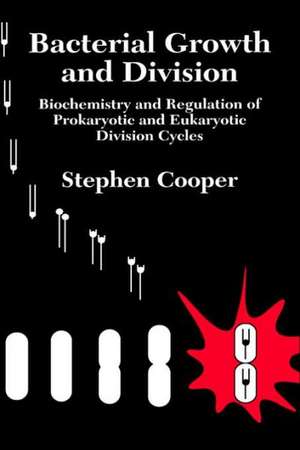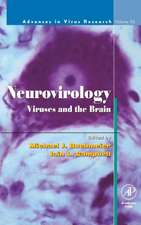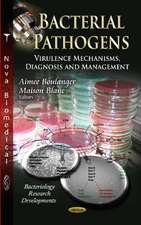Bacterial Growth and Division: Biochemistry and Regulation of Prokaryotic and Eukaryotic Division Cycles
Autor Stephen Cooperen Limba Engleză Hardback – 2 mai 1991
The concepts of bacterial physiology from Ole Maaløe's Copenhagen school are presented throughout the book and are applied to such topics as the origin of variability, the pattern of DNA segregation, and the principles underlying growth transitions.
The results of research on E. coli are used to explain the division cycles of Caulobacter, Bacilli, Streptococci, and eukaryotes. Insightful reanalysis highlights significant similarities between these cells and E.coli.
With over 25 years of experience in the study of the bacterial division cycle, Cooper has synthesized his ideas and research into an exciting presentation. He manages to write a comprehensive volume that will be of great interest to microbiologists, cell physiologists, cell and molecular biologists, researchers in cell-cycle studies, and mathematicians and engineering scientists interested in modeling cell growth.
- Written by one of the codiscoverers of the Cooper-Helmstetter model
- Applies the results of research on E. coli to other groups, including Caulobacter, Bacilli, Streptococci, and eukaryotes; the Caulobacter reanalysis highlights significant similarities with the E. coli system
- Presents a unified description of the bacterial division cycle with relevance to eukaryotic systems
- Addresses the concepts of the Copenhagen School in a new and original way
Preț: 446.97 lei
Preț vechi: 580.49 lei
-23% Nou
Puncte Express: 670
Preț estimativ în valută:
85.54€ • 92.88$ • 71.85£
85.54€ • 92.88$ • 71.85£
Carte tipărită la comandă
Livrare economică 23 aprilie-07 mai
Preluare comenzi: 021 569.72.76
Specificații
ISBN-13: 9780121879051
ISBN-10: 0121879054
Pagini: 501
Dimensiuni: 152 x 229 x 33 mm
Greutate: 0.87 kg
Editura: ELSEVIER SCIENCE
ISBN-10: 0121879054
Pagini: 501
Dimensiuni: 152 x 229 x 33 mm
Greutate: 0.87 kg
Editura: ELSEVIER SCIENCE
Public țintă
Bacteriologists, microbiologists, cell biologists and physiologists, molecular biologists, and geneticists; students in advanced bacterial cell physiology coursesCuprins
Bacterial Growth
A General Model of the Bacterial Division Cycle
Experimental Analysis of the Bacterial Division Cycle
Cytoplasm Synthesis during the Division Cycle
DNA Replication during the Bacterial Division Cycle
Synthesis of the Cell Surface during the Division Cycle
Density and Turgor during the Division Cycle
Variability of the Division Cycle
The Segregation of DNA and the Cell Surface
Transitions and the Bacterial Life Cycle
The Division Cycle of Caulobacter crescentus
Growth and Division of Streptococcus
Growth and Division of Bacillus
The Growth Law and Other Topics
The Eukaryotic Division Cycle
Conservation Laws of the Division Cycle
A General Model of the Bacterial Division Cycle
Experimental Analysis of the Bacterial Division Cycle
Cytoplasm Synthesis during the Division Cycle
DNA Replication during the Bacterial Division Cycle
Synthesis of the Cell Surface during the Division Cycle
Density and Turgor during the Division Cycle
Variability of the Division Cycle
The Segregation of DNA and the Cell Surface
Transitions and the Bacterial Life Cycle
The Division Cycle of Caulobacter crescentus
Growth and Division of Streptococcus
Growth and Division of Bacillus
The Growth Law and Other Topics
The Eukaryotic Division Cycle
Conservation Laws of the Division Cycle
Recenzii
"Stephen Cooper, one of the most original and experienced workers in the field of bacterial growth and division, has written a book that is as unconventional as it is interesting. His thoughts are clear, presented in an engaging style, and accessible to all. There is something here for everyone." --CELL
"A particularly welcome addition that will be useful to researchers, teachers, and advanced students. This volume presents a comprehensive review of the experimental evidence concerning the cell division cycle at the level of the individual cell and its regulation. As such, it is a unique and useful companion to other recent books that focus on the broader physiological, genetic, and biochemical issues of bacterial growth and its regulation. This book is especially attractive because it presents a focused physiological and biochemical review of the fundamental bacterial division cycle. Much of the presentation is framed within the context of the Copenhagen school that has spawned so much exciting information on microbial physiology over the years. Many unique models are used to illustrate key concepts and mechanisms." --ASM NEWS
"Fascinating... opens the scientific windows on the understanding of an expert within a specialist field. A highly detailed and careful analysis of experiments conducted by the author and by others. Refreshingly different. For a book of this length and scientific rigor its price is very reasonable, and it will prove to be a very useful reference book for those who carry out research in this area for many years." --TRENDS IN CELL BIOLOGY
"Although this book is devoted to the bacterial cell cycle, it is also a book on principles in biology and how living systems should be approached. Cooper is deeply convinced that, beneath all differences, a fundamental general unity in biology exists. Besides the unity in biochemistry, is also a unity with regard to the division cycle because of its logical construction. The book is well organized and the text is easy reading. The illustrations are superb and extremely helpful... An extensive list of index entries has been compiled and an impressive number of references are cited. There is also a list of all figures and tables and at the end of each chapter clarifying notes have been added. For years this book will serve as a standard for everyone looking for a refreshing overview of the bacterial cell cycle. In addition, I strongly recommend this book for advanced students who are interested in this topic because it is one of the rare scientific books that really can fascinate and inspire the reader. The book has its great merits in that it avoids just reviewing the facts but rather tries to describe how current ideas evolved from the experimental results. As stated in the prologue Cooper did not want to take away the human aspect of sciences. Indeed, it is a very human book and I gained a lot by reading this book because it is by Stephen Cooper." --BULLETIN OF MATHEMATICAL BIOLOGY
"A particularly welcome addition that will be useful to researchers, teachers, and advanced students. This volume presents a comprehensive review of the experimental evidence concerning the cell division cycle at the level of the individual cell and its regulation. As such, it is a unique and useful companion to other recent books that focus on the broader physiological, genetic, and biochemical issues of bacterial growth and its regulation. This book is especially attractive because it presents a focused physiological and biochemical review of the fundamental bacterial division cycle. Much of the presentation is framed within the context of the Copenhagen school that has spawned so much exciting information on microbial physiology over the years. Many unique models are used to illustrate key concepts and mechanisms." --ASM NEWS
"Fascinating... opens the scientific windows on the understanding of an expert within a specialist field. A highly detailed and careful analysis of experiments conducted by the author and by others. Refreshingly different. For a book of this length and scientific rigor its price is very reasonable, and it will prove to be a very useful reference book for those who carry out research in this area for many years." --TRENDS IN CELL BIOLOGY
"Although this book is devoted to the bacterial cell cycle, it is also a book on principles in biology and how living systems should be approached. Cooper is deeply convinced that, beneath all differences, a fundamental general unity in biology exists. Besides the unity in biochemistry, is also a unity with regard to the division cycle because of its logical construction. The book is well organized and the text is easy reading. The illustrations are superb and extremely helpful... An extensive list of index entries has been compiled and an impressive number of references are cited. There is also a list of all figures and tables and at the end of each chapter clarifying notes have been added. For years this book will serve as a standard for everyone looking for a refreshing overview of the bacterial cell cycle. In addition, I strongly recommend this book for advanced students who are interested in this topic because it is one of the rare scientific books that really can fascinate and inspire the reader. The book has its great merits in that it avoids just reviewing the facts but rather tries to describe how current ideas evolved from the experimental results. As stated in the prologue Cooper did not want to take away the human aspect of sciences. Indeed, it is a very human book and I gained a lot by reading this book because it is by Stephen Cooper." --BULLETIN OF MATHEMATICAL BIOLOGY











